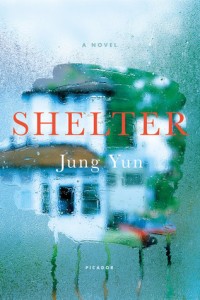Shelter by Jung Yun
 Friday, March 25, 2016 at 8:21AM
Friday, March 25, 2016 at 8:21AM 
Published by Picador on March 15, 2016
Kyung Cho is a Korean-American, 36 years old, who is married to Gillian, of Irish ancestry. They have significant debt. They are thinking about moving in with Kyung’s nearby parents when Kyung sees his mother, naked and bruised, walking through a neighboring field. He soon learns that something terrible has happened to his parents.
In Kyung’s dysfunctional family, father dominated mother and mother dominated son. It is a family without kindness, a family pretending to be normal. Kyung is trying to break that pattern in his own family, but breaking the pattern with his parents is more difficult. In adulthood, he has limited his interaction with them. Now circumstances force them together, with unhappy results.
Kyung is tense at every moment of this novel. Jung Yun conveys that tension so effectively that I felt tense while reading the story. Kyung is lost. He craves nothing but solitude and resents the well-meaning people who intrude. His parents are crime victims, but Kyung’s focus is on himself. His parents’ tragedy magnifies his own uncertainties and insecurities and discomfort. He desperately wants to be a better person, but he feels he’s never had a chance to develop the generosity of spirit that he sees in others. It’s only a matter of time before he melts down. Much of the novel’s drama comes from anticipation of the moment when it will happen. When drama finally presents itself, in a couple of different ways, it is all the more powerful for the foundation upon which it is built.
The question for the reader is whether Kyung is a victim of circumstances or whether he chooses to define himself as a victim rather than trying to improve his life and attitude. Kyung seems to be incapable of making good choices. It may be that nothing will make Kyung happy because he has chosen to be unhappy. Other characters also talk about how low expectations for life lead to an unhappy life. That’s one of the novel’s themes.
Another theme of Shelter is Kyung’s conflict between his role as a traditional Korean son (a role he plays poorly) and his role as an American husband (which he can play only because Gillian is, for most of his marriage, exceptionally tolerant). He is torn between American values (a husband should put his wife and child first) and traditional Korean values (a husband should put his parents first, his child second, his wife last). Kyung feels a similar conflict between his need to feel proud (or at least to avoid shame) and his need for money (which he could most easily acquire by asking his parents for help). The conflict between father and son is sharpened by the fact that Kyung and his father are so different while, in fundamental ways that are buried deep beneath the surface, they are so similar.
Still another theme is that people react to adversity in unexpected ways. Kyung thinks his parents should react to their painful experience differently than the reactions that they present to him and to their friends. He believes his father and the members of the church who are central to his father’s life have a distorted view of reality. Gillian thinks Kyung should react to his parents’ difficulties differently than the reaction that he presents to her. The point is that how people cope is how they cope ... or how they fail to cope. Their reactions aren’t necessarily right or wrong and it isn’t necessarily fair for others to judge them. At the same time, forgiveness is an essential part of moving on, although as various characters in the novel learn, it takes time to get there.
The novel moves from one dramatic moment to another, but none of the novel’s events are overdone or unbelievable. Yun’s supple prose and strong characterization complement a surprising story. The climax is satisfying, as is the novel as a whole.
RECOMMENDED
Reader Comments